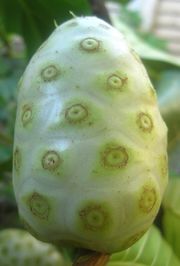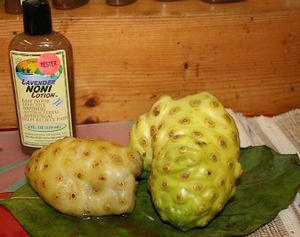Noni

Source: Tom Rulkens, Flickr. May 8, 2010. License: CC BY-SA-2.0
Noni is a tropical fruit that is used by some people to try to improve their health, with noni juice being a popular way to take noni.[1] Noni may be used for general aches and pains, infections, constipation, arthritis, although these uses aren't necessarily supported by research findings.[1]
Alternative names
Noni is also known as:
- Ba Ji Tian
- Bois Douleur
- Canarywood
- Cheese fruit or Rotten Cheese Fruit
- Great morinda
- Hai Ba Ji
- Hog Apple
- Hawaiian Noni or Tahitian Noni Juice
- Headache tree
- Jus de Noni
- Luoling
- Mengkudu
- Menkoedoe
- Mora de la India
- Morinda or Morinda Citrifolia
- Mulberry (although this may refer to a different plant), Beach Mulberry or Indian Mulberry
- Mûre Indienne
- Nhau
- Nono or Nonu
- Pau-Azeitona
- Ruibarbo Caribe
- Ura
- Wild Pine
- Wu Ning
- Yor[2][3][4]
Theory
Noni is a traditional medicine with a long history of use for health benefits.[1]
Evidence

Source: Jencu, on Flickr. Feb 26, 2012. License: CC BY-2.0
Noni is known to be a good source of potassium.[2]
Risks and safety
Noni is considered possibly safe when taken used as a food or drink, or applied to the skin as an ointment.[2] Up to 750ml of noni juice per day is generally considered safe, also sellers suggest 30ml as a typical dose,[5] and it is not considered any less safe than other fruit juices.[1]
It is sometimes mixed with other fruit juices, sugar, additives or preservatives, which may have negative effects on health [1]
Costs and availability
Noni is only grown in certain countries but can be imported.[2]
Costs depend on the brand, purity, and the form (juice, supplement, ointment, etc). Pure noni juice prices are around $20 USD for 16oz (473ml) of pure noni juice in the United States, but significantly less if bulk amounts are bought.[5]
See also
- Chronic pain
- Analgesics (pain medications, category)
Learn more
- Noni - drugs.com
- Noni - WebMD
- Noni - National Center for Complementary and Integrative Health
- Benefits of noni juice - WebMD
References
- ↑ 1.0 1.1 1.2 1.3 1.4 "Health Benefits of Noni Juice". WebMD. Retrieved March 12, 2021.
- ↑ 2.0 2.1 2.2 2.3 "Noni Uses, Benefits & Side Effects". Drugs.com Herbal Database. Retrieved March 12, 2021.
- ↑ "NONI: Overview, Uses, Side Effects, Precautions, Interactions, Dosing and Reviews". WebMD. Retrieved March 12, 2021.
- ↑ "Noni". National Center for Complementary and Integrative Health. Retrieved March 12, 2021.
- ↑ 5.0 5.1 https://www.healingnoni.com/product/pure-hawaiian-noni-juice/

